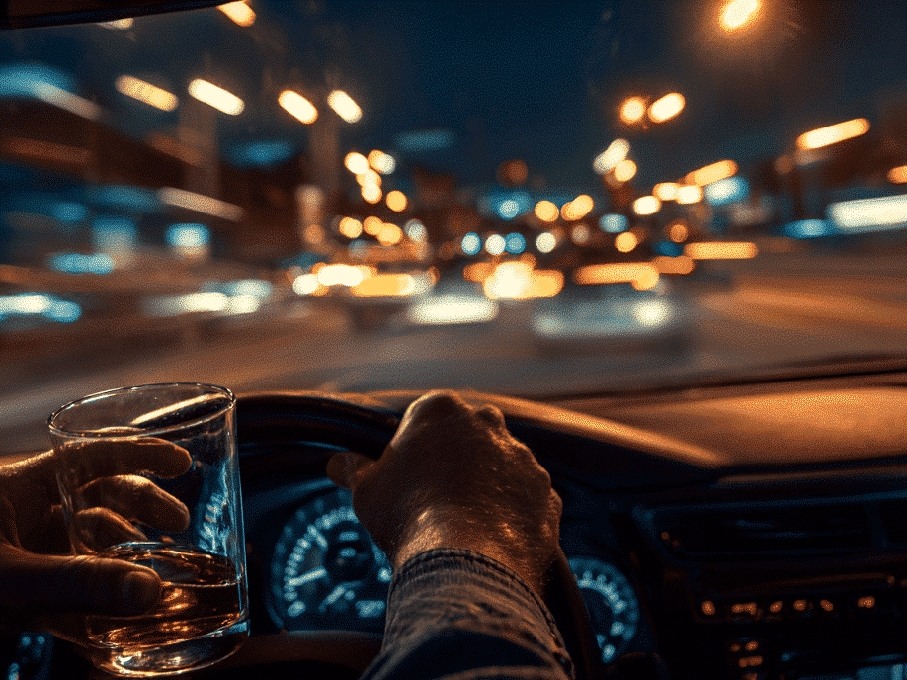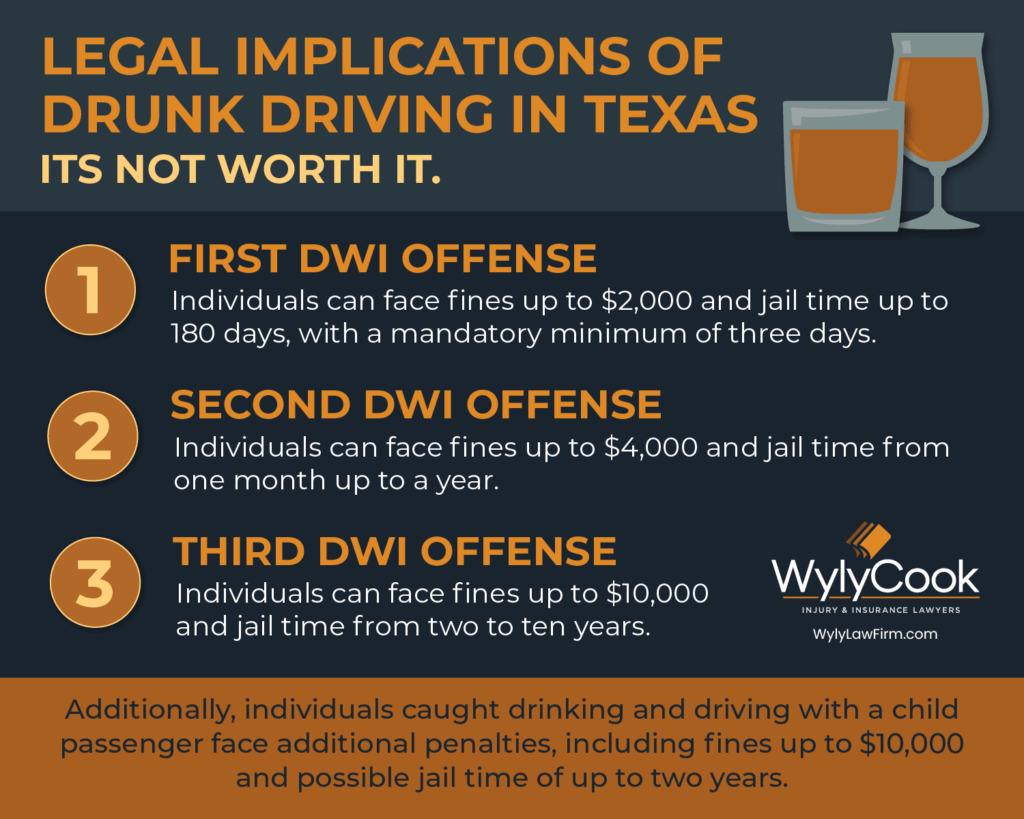Key Takeaways
- On average someone is injured or killed in an alcohol-related crash in Texas every hour.
- Alcohol-related crashes account for over 25% of traffic fatalities in Texas.
- Strict legal penalties for drunk driving, including hefty fines and potential jail time, reflect Texas’s commitment to deterring this dangerous behavior and protecting road users.
Let's Go Beyond, to Bring You Back
Let's get you the compensation you're entitled to. Get a FREE Consultation today.
Let's Go Beyond, to Bring You Back
You deserve the compensation you’re entitled to, call for your FREE Case Review today.
The Frequency of Alcohol-Related Crashes in Texas
In Texas, the frequency of alcohol-related crashes is staggeringly high. On average, someone is injured or killed in such a crash approximately every hour. This statistic is a stark reminder of the pervasive nature of this issue. Thousands of alcohol-related crashes are reported annually in Texas.
The sheer scale of fatalities and injuries resulting from these crashes is heart-wrenching.
- In 2019, alcohol-related crashes resulted in 900 deaths and over 2,000 serious injuries.
- These crashes made up 25% of all crash fatalities in the state.
- Weekends and holidays are particularly perilous times, with DUI-related crashes peaking during these periods.
- The early hours of the morning, specifically between 2 a.m. and 3 a.m., see a significant number of these fatal incidents, primarily on weekends.
Even during times when overall traffic volumes have decreased, such as during the COVID-19 pandemic, the number of DUI fatalities did not follow suit. In 2020, despite fewer cars on the road, there was an increase in DUI fatalities, reversing a previously declining trend. This highlights the persistent and unyielding nature of drunk driving as a critical threat to Texas motorists.
These statistics paint a vivid picture of the state of the ongoing battle against drunk driving in Texas. They emphasize the urgent need for continued awareness, stricter enforcement, and proactive measures to protect lives on the road.
Consequences of Alcohol-Related and Drug-Related Crashes

Survivors of these crashes often endure physical injuries that require long-term medical treatment and rehabilitation. Recovery can be arduous and rife with challenges, as victims may face long-term disabilities that impair their quality of life or ability to work. The financial burden is another harsh reality. Families of those injured or killed frequently experience financial hardships due to mounting medical expenses and the loss of income.
While some financial assistance may be available through government programs to cover medical bills and funeral costs, it falls far short of addressing the full scope of the financial strain. The emotional toll is also profound. Victims and their families navigate a labyrinth of grief and trauma, struggling to come to terms with the life-altering impact of these crashes.
Common Causes of Alcohol-Related Crashes
Many individuals wrongly believe they can “handle their liquor” or that they are “okay to drive” after consuming excessive amounts. This false confidence is only enhanced by alcohol’s impairing effects on judgment and lowering of inhibitions, leading individuals to make risky decisions like choosing to drive drunk. All too often drunk drivers who make it home will, upon sobering up, admit that they should not have been driving. But then they make no plan to ensure they make a better decision the next time they drink.
Alcohol causes crashes by significantly slowing reaction times, making it difficult for drivers to respond promptly to sudden changes in the driving environment. This delay can mean the difference between avoiding an accident and causing one. Alcohol also impairs perception and motor control. The deadly cocktail of bad judgment, dulled reactions, unclear perception, and reduced motor control makes drunk drivers into one of the road’s most dangerous situations, and puts everyone on the road a moment’s lapse away from tragedy.
Recognizing why drunk driving happens explains why alcohol-related crashes are so prevalent. Admitting the dangers of impaired driving allows us to take proactive steps to avoid these situations and encourage others to do the same. Education and awareness are key components in reducing the incidence of these preventable accidents. Making a transportation plan while sober (such as committing to using public transit, taxis, ride sharing, or a designated driver) is key to avoiding making bad decisions when drunk.
Legal Implications of Drunk Driving in Texas
The severe legal implications of drunk driving in Texas are designed to deter this dangerous behavior. For a first DWI offense, individuals can face fines up to $2,000 and jail time of up to 180 days, with a mandatory minimum of three days. This serves as a stark warning to those contemplating drinking and driving.
The penalties escalate with subsequent offenses. A second DWI offense can result in fines up to $4,000 and jail sentences ranging from one month to a year. The consequences become even more severe with a third DWI conviction, which can incur a fine of $10,000 and a prison sentence ranging from two to ten years.
Additionally, individuals caught drinking and driving with a child passenger face additional penalties, including fines up to $10,000 and possible jail time of up to two years.
These substantial fines and potential jail time underscore the serious legal ramifications of drunk driving in Texas. They highlight the state’s commitment to curbing this dangerous behavior and protecting its citizens from the devastating effects of alcohol-related crashes.
Accident Lawyer
Get Compensated For Your Injuries & Damages! Call Us For A FREE Case Review And Know What Your Case Is Worth.
How to Stay Safe on Texas Roads
Staying safe on Texas roads requires vigilance and proactive planning. One of the most effective strategies is to always plan for a sober ride before consuming any alcohol. This ensures that you have a safe way to get home without risking your life or the lives of others. Ride-sharing services, taxis, or public transportation provide a reliable option to avoid drinking and driving.
When serving as a designated driver, remaining absolutely sober is crucial. Thankfully, many venues will provide low-cost or free non-alcoholic beverages to designated drivers who commit to remaining completely sober.
Driving while tired can intensify the depressant effects of alcohol, significantly increasing alcohol’s effect of impairing response times. Unfortunately, drinking is often done at night, meaning this effect is commonly in play. If you’re tired when you drink, you must be extra vigilant in deciding if driving is safe.
Similarly, combining alcohol with illegal drugs or even many common and legal medications can increase the effect of alcohol on a driver’s coordination and perception. Pain medications, anxiety medications, sleeping pills, and antidepressants are just some of the medications that can have negative interactions with alcohol. Pharmacists can warn when medications should not be combined with alcohol, and many drugs are labeled with warnings not to combine them with alcohol.
Taking these precautions significantly reduces the risk of causing an alcohol-related crash.
Support and Resources for Victims
Several resources are available to support and assist those affected by alcohol-related crashes. Mothers Against Drunk Driving (MADD) offers free services for victims and survivors of impaired driving, including emotional support and guidance. MADD provides around-the-clock support and resources to help individuals cope with their experiences.
MADD offers several support services and programs:
- Connects victims and survivors to support groups and resources tailored to their needs.
- Maintains a private Facebook group where members can share their experiences and seek support from others who understand their struggles.
- Runs the Portraits for Healing program, which provides victims with a portrait to honor those impacted by impaired driving.
These resources can be invaluable in helping victims navigate the aftermath of alcohol-related crashes. They offer a lifeline of support, ensuring that no one has to face these challenges alone.
Contact an Experienced Drunk Driving Crash Attorney
Legal support ensures that victims of drunk drivers have their rights protected. An attorney can help the victim and their family navigate the complexities of claiming compensation, including determining whether any bar or venue shares responsibility for the injury. An experienced attorney gathers evidence, negotiates with insurance companies, and advocates for rightful compensation. Drunk driving accident victims should contact an experienced attorney to ensure they receive the necessary aid.
An attorney with drunk driving accident expertise can guide you through the legal process, helping you understand your rights and options. Seeking professional legal assistance, including a free consultation, maximizes the chances of receiving fair compensation and moving forward with your life.
Let's Go Beyond, to Bring You Back
Let's get you the compensation you're entitled to. Get a FREE Consultation today.
Let's Go Beyond, to Bring You Back
You deserve the compensation you’re entitled to, call for your FREE Case Review today.
Frequently Asked Questions
How often do alcohol-related crashes occur in Texas?
Alcohol-related crashes on average occur approximately every hour in Texas, resulting in injuries or fatalities.
What are the legal consequences of a DWI conviction in Texas?
The legal consequences of a DWI offense in Texas can include fines up to $2,000 and incarceration for up to 180 days, up to ten years in prison for repeated convictions. Additionally, you may lose your license, be subject to testing and monitoring, or need an interlock device installed in your vehicle.
Can victims of alcohol-related crashes receive financial compensation?
Victims of alcohol-related crashes can indeed receive financial compensation from the driver that injured them. They may also have a claim against a bar or venue that overserved a patron. Finally, limited government programs designed to assist with expenses such as medical bills and funeral costs may assist. It is advisable to explore available resources to secure the necessary support.
What support resources are available for victims of drunk driving incidents?
Victims of drunk driving incidents can access support through organizations such as Mothers Against Drunk Driving (MADD), which provides free services, support groups, and 24/7 assistance. This support network is valuable for healing and recovery.
What are some tips to stay safe on the roads in Texas?
To ensure safety on Texas roads, always plan for a sober ride by utilizing ride-sharing services or taxis, and avoid distractions while driving. Staying completely sober if you are the designated driver is essential for your safety and that of others.
Related Article(s)
What Percentage of Motorcycle Riders Get in Accidents? | Key Statistics & Facts
Understanding High-Side Motorcycle Crashes: Causes and Prevention Tips



